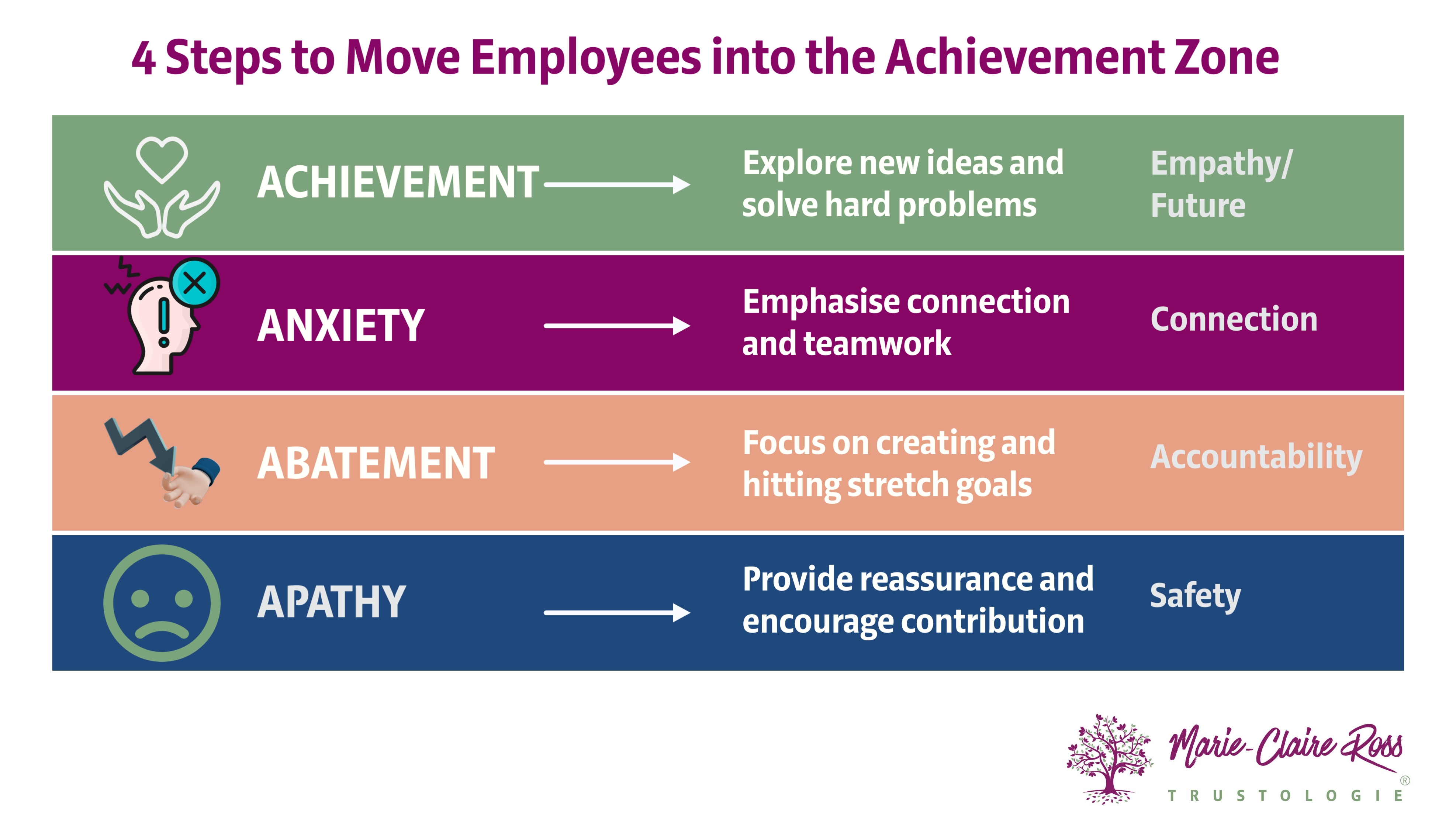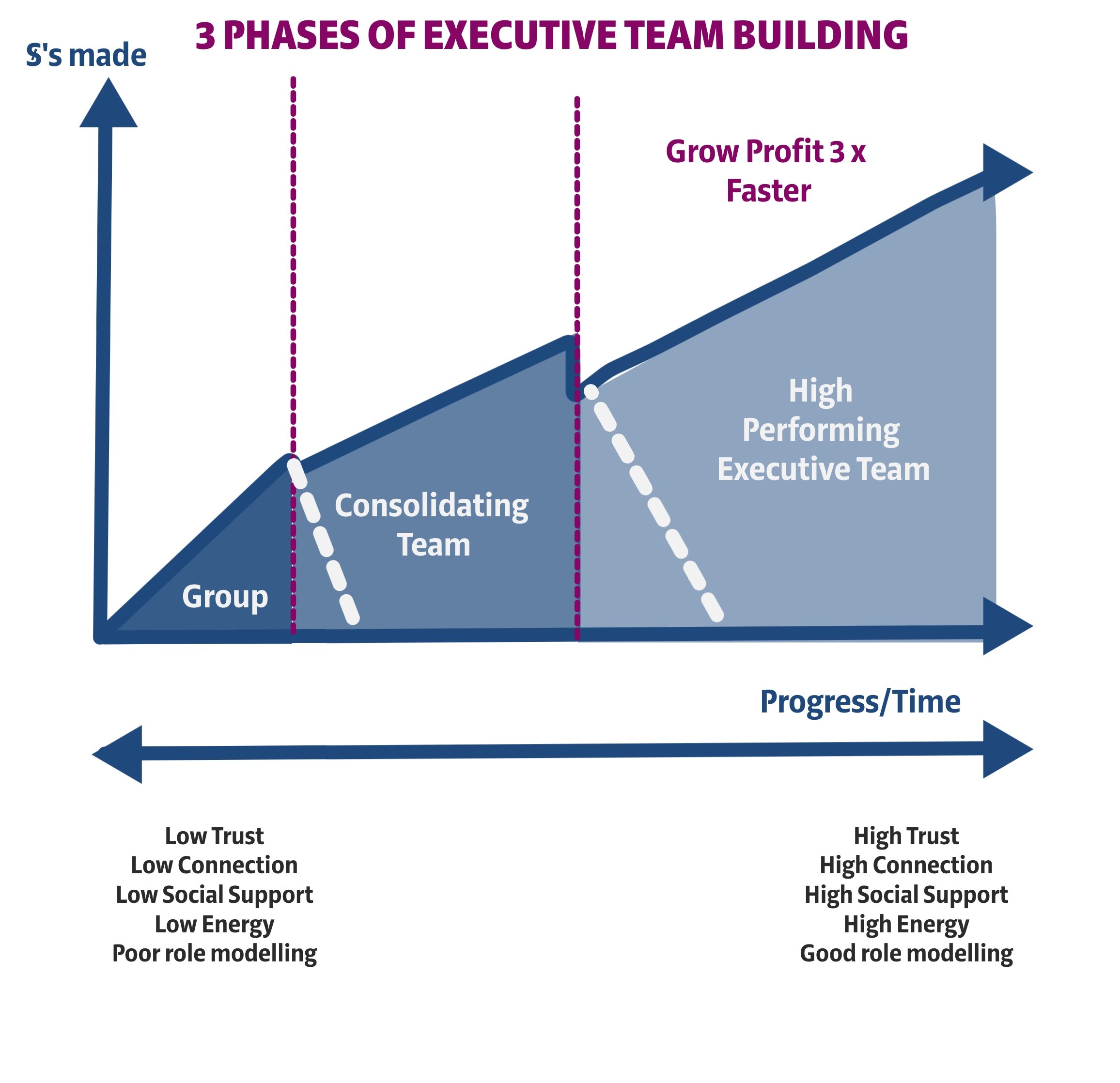9 min read
5 Ways Emotional Intelligence Transforms Your Leadership Presence Today
True leadership presence isn’t a performance or a set of charisma hacks; it is the felt experience of who you are being in the room. By cultivating...
Develop leaders, strengthen executive teams and gain deep insights with assessments designed to accelerate trust and performance.

Transform how your leaders think and perform with keynotes that spark connection, trust and high-performance cultures.

Explore practical tools, thought-leadership and resources to help you build trusted, high-performing teams.

Trustologie® is a leadership development consultancy founded by Marie-Claire Ross, specialising in helping executives and managers build high-trust, high-performing teams.

4 min read
Marie-Claire Ross : Updated on August 4, 2022
-1.jpg)
If we want to lead our teams into the achievement zone, we need to lead ourselves there first.
Teams in the achievement zone are high performing. They are led by a leader who fosters both high psychological safety and accountability in the team. You know when your team is in this zone when everyone works together, with high energy - solving problems, making fast decisions, achieving goals and collaborating with ease.
-1.jpg?width=2312&name=Psychological-Safety-and-Accountability%20(1)-1.jpg)
This occurs when a team leader creates stretch goals and challenges direct reports to improve and strongly believes they can achieve. A lot of leaders approve small incremental improvements to goals. But a leader in this zone treats employees like athletes pushing them to continually improve – breaking their best records, not by a few degrees but through dramatic improvement.
Achievement zone leaders foster a supportive environment where employees learn and work together, focus on continuous improvement and explore exciting new possibilities. After all, people tend to not spontaneously stretch themselves, but need the support of a leader who fosters the right environment to grow and learn. In this environment, people thrive on the autonomy to work how they want and contribute to high level decisions.
The achievement zone team only occurs when the leader leads by example and works hard to ensure they are trusted by the team and encourages team members to trust one another.
Last week, I mentioned that to operate in the achievement zone, we have to trust ourselves.
Self-trust is one of the hardest skills to manage as a leader. And one of the most-under-rated. I provided 9 Steps to Improve Self-Trust Levels to help you. Because we can't leap into leading people into the achievement zone, if we are still operating in the anxiety zone.
Once you are on the journey to making yourself feel stable and trusting yourself more, you can take action to help you direct reports get into the achievement zone. And the key theme to get you there is explore new ideas.
Here are some tips to help:
1. Envision a Positive Future
Remember when you were a kid and you used to daydream? Neuroscience has discovered that when we allow our mind to wander, a distinct network of the brain fires up. Neuroscientist call this the “default” network.
This network is engaged during transcendence - when we envision what it’s like to be in a different place, in a different time doing different things to now. During transcendence, our brains “detach” themselves from the external environment and stop processing external stimuli.
Schedule time during your week to envision your future. When I wake up, I spend three minutes each morning (while I'm still in bed) living a day in my ideal future. I see myself in clothes I love, doing work I love and having an enjoyable day at work. Then, driving home in my dream car to my dream home and spending time with my happy family.
2. Get Curious
Neuroscientists have also discovered that being curious lights up the reward network of our brain. Learning new things makes us feel safe.
Scheduling unfocused free time to allow yourself to do or think what you want to is a powerful technique to get you into the achievement zone. Unassigned time for creativity has been found to enhance self-sufficiency, happiness, and motivation. In the past, Google had a "20% time" policy where engineers had a day a week to work on whatever they want. This created breakthrough innovations such as Gmail.
You can do this for yourself in lots of way. It might be that you schedule time to read industry magazines, do a Google search on trends in your industry or read books on topics that interest you. You could even make time to call other people and ask about what changes they are seeing in their world. You can even just get playful asking yourself "What if?" or "Why not?" questions. Questions such as 'What if we did it this way?" or "What would happen if we reduced the time of our team meetings?"
3. Continuous improvement - Leaders who are in the achievement zone are always looking to improve what they do. They are never happy with the status quo. They learn from both success and failure. This means they are open to accepting feedback from others. They don't get defensive. Instead, they take feedback and do what they can to improve, if the feedback is valid. One technique that I teach leaders during coaching is SKS. Ask your direct reports, peers and boss:
What should I stop doing?
What should I keep doing?
What should I start doing?
Research by Carter Cast in the book, The Right (and Wrong) Stuff: How Brilliant Careers are Made and Unmade, indicated that job proficiency simply isn’t enough. Without self-awareness and the ability to work well with others, managers’ and leaders’ careers are at dire risk of derailing.
Not knowing what you are doing that might be causing issues can mean improvement is forced upon you. These questions provide specific information to help us know what we should quit, continue, and start doing. Ensuring that we live in reality and have made the choice to improve.
4. Be Accountable
We can't expect our teams to be accountable, if we aren't.
When we make good on our promises and we get things done - it feels amazing. Our team trusts us. And importantly, we trust ourselves. But it means doing things we don’t want to do.
As adults, only we have control of our lives. No-one else. We might think that we don’t have a choice, but we do. We can choose to go to work or not. We can choose to complain about our lot or not. The unhappiest people I know are those that do not accept personal responsibility for their lives and complain about their life. The truth is that when we accept responsibility, we actually feel in control. It increases our personal freedom and happiness.
The good news is that if you realise you need to be more accountable then you are on track to improving your results. And it ensures that your team will be accountable to results, as well.
5. Set yourself Stretch Goals
You can't expect your direct reports to stretch themselves, if you are setting yourself easy goals. Keep challenging yourself to improve. Set audacious goals and enrol an accountability partner, if your boss tends to not hold you accountable to challenging yourself.
Leading your team into the achievement zone requires a range of techniques to ensure that your direct reports see you as authentic. That you demand the best from them, as well as yourself. At its core, it means you are excited about the future - new ideas and doing things differently. Continually learning and growing. Use these techniques to strengthen your leadership and inspire your day.

9 min read
True leadership presence isn’t a performance or a set of charisma hacks; it is the felt experience of who you are being in the room. By cultivating...

13 min read
As teams return from their summer (or winter) break, you may notice subtle shifts in your team’s energy. Even if the end of year was positive, a new...

14 min read
The workplace is evolving at a pace few previous generations have seen and 2026 will mark a turning point. The Future of Work is blended, not hybrid....

Transitioning to managing a remote team when your team is normally co-located requires a steep learning curve for both team leaders and team members....

Everything is a product of evolution. Businesses go through cycles and need the right executives working at the right level for the business at that...

When an organisation has experienced market success for a sustained duration, it is common for CEOs and some executive team members to assume the top...